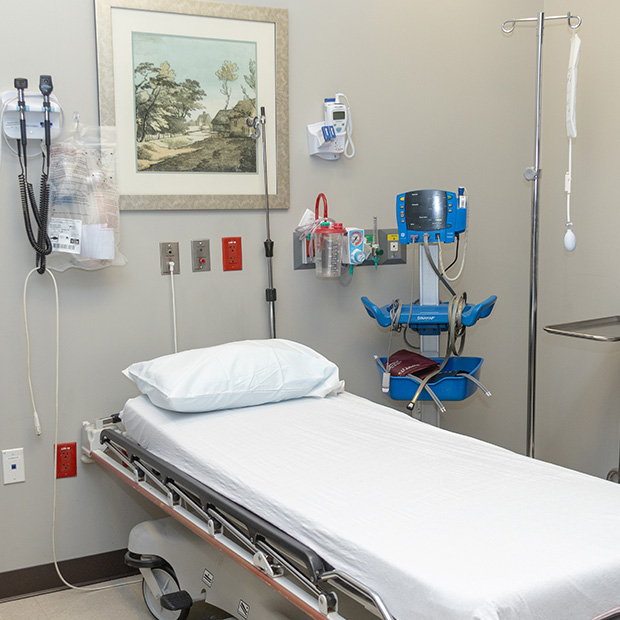
Abdominal Pain Emergency Care in Dallas
When is Stomach Pain an Emergency?
Abdominal or stomach pain can have a wide range of causes, from mild issues like constipation to serious conditions like appendicitis or diverticulitis. Any abdominal pain should be considered a potential emergency, and should be evaluated by a doctor to ensure you do not need immediate surgery. At Advance ER, we are equipped with advanced labs and imaging is essential to accurately diagnose emergent abdominal conditions.
It’s crucial to recognize when abdominal pain may signal a medical emergency and know where to seek care. If you're experiencing concerning symptoms, call (214) 494-8222 or contact us online to learn more about abdominal pain emergency care in Dallas.
Abdominal pain may be an emergency and require immediate attention if you experience:
- Consistent or worsening pain
- Pregnancy-related pain
- Recent abdominal surgery
- Pain or pressure in the chest
- Difficulty breathing
- Blurred or obscured vision
- Dizziness, fainting, or disorientation
- Coughing or vomiting blood
- Noticeable abdominal swelling
- Pain accompanied by diarrhea or vomiting
- Black, tarry stools or blood in stool/vomit (resembling coffee grounds)
- Inability to pass a bowel movement with nausea
If you have any of these symptoms, visit an emergency room immediately.
Could Your Abdominal Pain Indicate Appendicitis?
If you haven’t had your appendix removed, abdominal pain could indicate appendicitis.
Symptoms of appendicitis include:
- Sudden pain on the right side of the lower abdomen
- Pain worsening with movement
- Abdominal bloating
- Constipation or diarrhea
- Loss of appetite
- Nausea and Vomiting
- Pain starting near the navel and shifting to the right side
Appendicitis is a medical emergency. Monitor your symptoms carefully, remain calm, and seek care if needed.
Common Causes of Abdominal Pain
- Digestive Issues: Indigestion, constipation, diarrhea, gastroenteritis, gastritis, and irritable bowel syndrome (IBS).
- Gastrointestinal Disorders: GERD, peptic ulcers, inflammatory bowel disease (IBD), and diverticulitis.
- Gallbladder and Liver Conditions: Gallstones, cholecystitis, hepatitis, and liver abscess.
- Pancreatic Disorders: Pancreatitis and pancreatic cancer.
- Urinary Tract Conditions: UTIs, kidney stones, and bladder infections.
- Reproductive System Issues: Ovarian cysts, pelvic inflammatory disease (PID), and endometriosis.
- Medication Side Effects: Medications such as Ozempic, Semaglutide, Wegovy, Mounjaro, Zepbound, Tirzepatide, GLP-1 can lead to severe or emergent abdominal pain.
- Other Causes: Abdominal hernias, appendicitis, trauma, and side effects of certain medications.
Frequently Asked Questions About Abdominal Pain
What are some risk factors for developing abdominal pain?
- Age: Certain conditions, such as appendicitis, are more common in younger individuals.
- Diet: Low-fiber, processed-food diets increase the risk of digestive issues.
- Smoking: Linked to higher risks of stomach ulcers and other digestive conditions..
- Alcohol consumption: Excessive use can irritate the stomach and liver.
- Sedentary lifestyle: Lack of physical activity may lead to digestive problems.
- Certain medications: Certain drugs can have abdominal pain as a side effect.
How can I prepare for an emergency room visit at Advance ER for abdominal pain?
- Bring a list of your current medications, including dosages and any recent changes.
- Document your symptoms, including when they started, how long they last, and their severity.
- Bring a list of any allergies or medical conditions you have.
- If possible, bring a family member or friend to provide support and to help you remember details during your visit.
When in doubt, it’s always better to seek care. At Advance ER, we’re available 24/7 to provide expert emergency care for abdominal pain, ensuring you get the answers and treatment you need.

-
 The Advance ER Team Providing Reliable Medial Care
The Advance ER Team Providing Reliable Medial Care -
 ER Insight Vital Knowledge for Life-Saving Moments
ER Insight Vital Knowledge for Life-Saving Moments -
 ER Knowledge Hub Your Source for Expertise on Health, Emergencies, and Beyond
ER Knowledge Hub Your Source for Expertise on Health, Emergencies, and Beyond
When to Get Medical Help for Abdominal Pain
- Severe or Persistent Pain: Especially if accompanied by other concerning symptoms such as fever, vomiting blood, or difficulty breathing.
- Sudden Onset of Pain: Especially if it is severe and unexplained.
- Changes in Bowel Habits: Including persistent diarrhea or constipation.
- Presence of Blood in Vomit or Stool: Which may indicate a serious underlying condition.
Abdominal pain can be a sign of various underlying medical conditions, ranging from mild to severe. It's important to pay attention to your symptoms, seek medical evaluation when needed, and follow the guidance of healthcare professionals for appropriate diagnosis and treatment.
Contact us today for more information from Advance ER about emergency care for abdominal pain in Dallas.



[8].2112210947272.png)